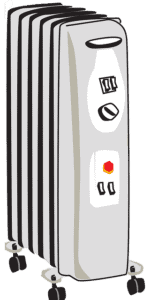
Fires are a common hazard while operating electrical devices. The current moving through the wires in these devices produces heat which, if adequate cooling systems are not in place, can cause the circuit boards to catch on fire.
It is quite a dangerous possibility which is why all electrical goods manufacturers take added precautions and account for cooling whilst designing their inventions.
This is done so that the heat can escape and the temperatures don’t flare up to the point of starting a fire. Fires are dangerous as they are but electrical fires are even more so because you can’t use water to put it out.
Water is a conductor of electricity and if electric fires come in contact with water, the person administering it might get electrocuted. Thus we have to be extra careful when dealing with electrical fires.
Plus there’s this whole thing of the electrical device getting completely destroyed if it catches on fire.
We know that electrical instruments almost always emit radiation. So the question is, do electrical fires produce radiation?
In this article, we take a look at electrical fires, their effects with respect to radiation, and how to quickly subdue it if an electrical fire broke out.
Do electrical fires emit radiation?
Yes and no. Yes, they emit radiation but not in the way you’re probably thinking. You see, heat is in the radiation spectrum. It is called thermal radiation.
When there’s an electric fire, there are loads and loads of thermal radiation being produced.
Not only that, the heat can interact with the metallic wires and other silicon components and generate X-Rays which are substantially more dangerous to human beings if exposed for long.
In everyday use, the most dangerous type of radiation a wireless device generates is RF. If that device happens to catch on fire, there is no RF radiation but there are copious amounts of thermal radiation, decaying EMF radiation, and X-Ray radiation.
So while there is no RF radiation being emitted in an electric fire, it is still very dangerous to be near one because of the other kinds of radiation that are being emitted from it.
The effect of fire radiation
Let’s assume you happen to be at a place where an electric fire is raging. What does it mean for your health?
The first thing is, you are getting exposed to all kinds of radiation the first of which is decaying EMF radiation.
Decaying EMF is basically EMF that was being produced as a result of current running through the device. While the device is on fire, the leftover EMF radiation starts to decay and leak out.
In the process, it mixes with thermal radiation from the fire and gains more power. These radiation waves can interact with your cellular structures and create all sorts of problems for your health.
Studies have shown that fire radiation can be the cause of multiple chronic conditions. Scientific analysis of health conditions among firefighters specializing in electrical fires shows us definitively how radiation plays a role in the deterioration of health in these individuals.
Almost all of the firefighters from the study admitted to having specific symptoms commonly identified with radiation exposure and some even exhibited more acute chronic conditions that too are believed to be brought about by too much radiation exposure.
Common conditions included things like lack of attention, loss of appetite, and slow motor response to name a few.
But there were a number of acute conditions too that were more serious and threatened their quality of life. These included:
- Damage to the central nervous system: Too much radiation exposure from electrical fires can cause neurological conditions and psychotic behavior. This is a medical emergency and can significantly diminish one’s quality of life.
- Damage to our immune system: The high-energy thermal radiation from the electric fire can easily penetrate through the skin and interact with our cellular structures. In doing so, it puts the body under tremendous stress which ultimately caps the body’s ability to protect itself against external factors. This ultimately leads to a compromised immune system that is not strong enough to defend against diseases and chronic conditions.
- Damage to our endocrine system: These radiations can also play a pivotal role in manipulating our hormone production. If our endocrine glands are too affected by all the thermal activity going on, it may divert from producing the required hormones and thus throw our bodies into utter chaos. This disruption may have serious consequences to our health and put us at higher risk of contracting chronic diseases.
- Interference with our DNA structures: The thermal radiations produced from electrical fires are powerful enough to put our DNA strands through excessive stress. As a result, the DNA strands evolve and modify themselves to better cope with this thermal pressure. This can be detrimental since in order to modify itself it may lose certain proteins that give us our necessary individual characteristics. This can also mean compromised bodily response to diseases and reduced ability to defend against chronic conditions.
- Reduce fertility: Thermal radiation is also known to significantly reduce fertility among both sexes by manipulating hormonal activity. It is also linked with decreased libido and weakened sperm cells.
How to contain an electrical fire?
The first thing you should definitely not do is use water. It is often our first impulse to subdue the fire with water but if it is an electrical fire, you will get electrocuted and anywhere the water splashes into would be electrified. It is therefore a terrible idea.
The best way to handle it is by using fire extinguishers. The professional grade extinguishers have foam and carbon dioxide packed within it in a compressed manner.
When it is sprayed, the foam and carbon dioxide rush out onto the lit surface and cuts off oxygen supply. As you know, in order for a fire to burn we need oxygen. In cutting oxygen by engulfing the object with carbon dioxide, the fire is eventually subdued.
Another effective method is to throw blankets at the fire. The point with this method too is similar – to cut off the oxygen supply.
The heavy blanket does not allow outside air to come in easily and the inside air of the blanket depleted of oxygen cannot continue to burn effectively thus ending the fire.
Another popular way of dealing with electrical fires is to use sand. This too follows the same idea of cutting off oxygen.
Sand when heaped over the burning surface cuts off all oxygen supply from the outside and eventually reduces the fire. This is why you see buckets of sand at every fire exit.
If you are not sure if the fire is electrical or not, it is always safe to assume that it is. Because if you assumed it was not electrical fire and later turned out it was, the mistake could cost dearly.
Therefore it is best to exercise caution and always approach fires prepared for the worst-case scenario.
Lastly, if you are in an electrical fire please do not try to bring it under control all by yourself. Please call the fire department immediately. They are trained professionals who specialize in putting out fires safely with minimal risks.
If you were to do it on your own, you may unknowingly put your and your fellow neighbors’ lives in danger.
Related questions
- Can my computer catch on fire if I use it for too long?
Computers are sophisticated machines designed to give you optimal performance in all sorts of conditions.
They are designed with ingenious cooling architectures that allow them to dissipate heat at all times so that you are able to operate them for the longest time without worrying about heating problems. Thus it is safe to say that the chances of your computer catching fire are low.
However, it is not something that hasn’t ever happened. Motherboards are often burned if the CPU is overclocked without proper cooling systems in place, if the fans are not doing a good job of getting the heat out or if the thermal paste has worn off and there is nothing to keep the temperature in check.
However, if you are a regular user you have nothing to worry about. Computers don’t get hot to the point of catching on fire in day-to-day usage.


